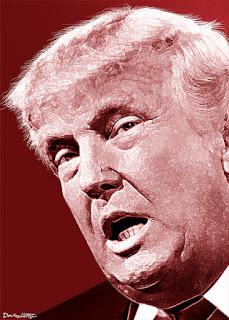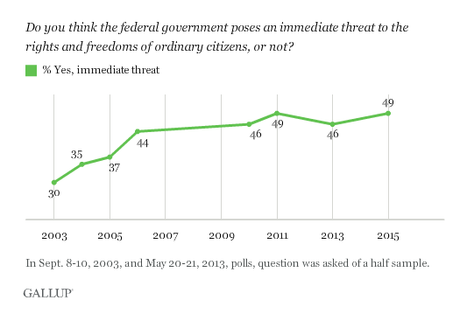 For quite a while now, Donald Trump (image at left by DonkeyHotey) has led all the polls done on the Republican race for the presidential nomination. This came as a surprise to many people, and a lot of people (including me) believe Trump can't sustain his candidacy in the long haul -- that as other candidates drop out, he will fade as other candidates pick up the support of those dropping out.
For quite a while now, Donald Trump (image at left by DonkeyHotey) has led all the polls done on the Republican race for the presidential nomination. This came as a surprise to many people, and a lot of people (including me) believe Trump can't sustain his candidacy in the long haul -- that as other candidates drop out, he will fade as other candidates pick up the support of those dropping out.But that may not be true.
This article by Chris Cillizza in The Washington Post presents a good case for Trump (or another outsider) winning that nomination. Here is part of that article:
I've spent an inordinate time of late trying to understand the rise of Donald Trump and what it tells us about how Americans view politicians, politics and the state of the country more generally. I came across this chart, which was released recently by Gallup, and thought it told the "why" of Trump as well as anything I've seen.

Half of the country believes that the federal government "poses an immediate threat to the rights and freedoms of ordinary citizens. HALF! The party breakdown is even more remarkable. Two-thirds (65 percent) of self-identified Republicans believe their government poses an immediate threat to their rights and freedoms. (Worth noting: Just 32 percent of Democrats feel that way.) That is a startling number -- and speaks not only to the massive disgust and disenchantment among Republicans toward the government, but also the urgency of the perceived threat that it poses. The idea of the government swooping in to restrict your rights is not an abstract discussion for many people -- especially those who identify as Republicans. It is a real and present danger.
The chart above also suggests the idea of the government as an active threat to personal liberties is rapidly rising. A decade ago, only 37 percent of the public called the federal government an immediate threat, and as recently as 2003, only three in 10 people viewed the government that way. Explains Gallup head honcho Frank Newport: "Republican agreement with the 'immediate threat' statement has been higher during the Obama administration than was Democratic agreement during the Bush administration, thus accounting for the overall rise in agreement across all national adults." . . . What you have at work is the usual contempt/concern about the federal government mixed with increased Republican worries about not just President Obama but the priorities he has pursued and will pursue before he leaves office. Trump speaks directly to those fears and that anxiety. Yes, he says, your worries about the direction of the country are warranted. It is going to hell in a handbasket. The people in charge are trying to fundamentally change what it means to be Americans right under our noses. And it goes without saying, the only way to address this creeping government state is to elect someone like Trump (okay, Trump himself) to bring things back to the "way it used to be." For those who roll their eyes about Trump -- and, to an only slightly lesser extent, Ben Carson -- you might be missing the boat on how your fellow Americans feel about their government. And, for those who laugh off the possibility of an "outsider" candidate being the Republican nominee, all you need to do is look at the Gallup chart above to see why you shouldn't.

